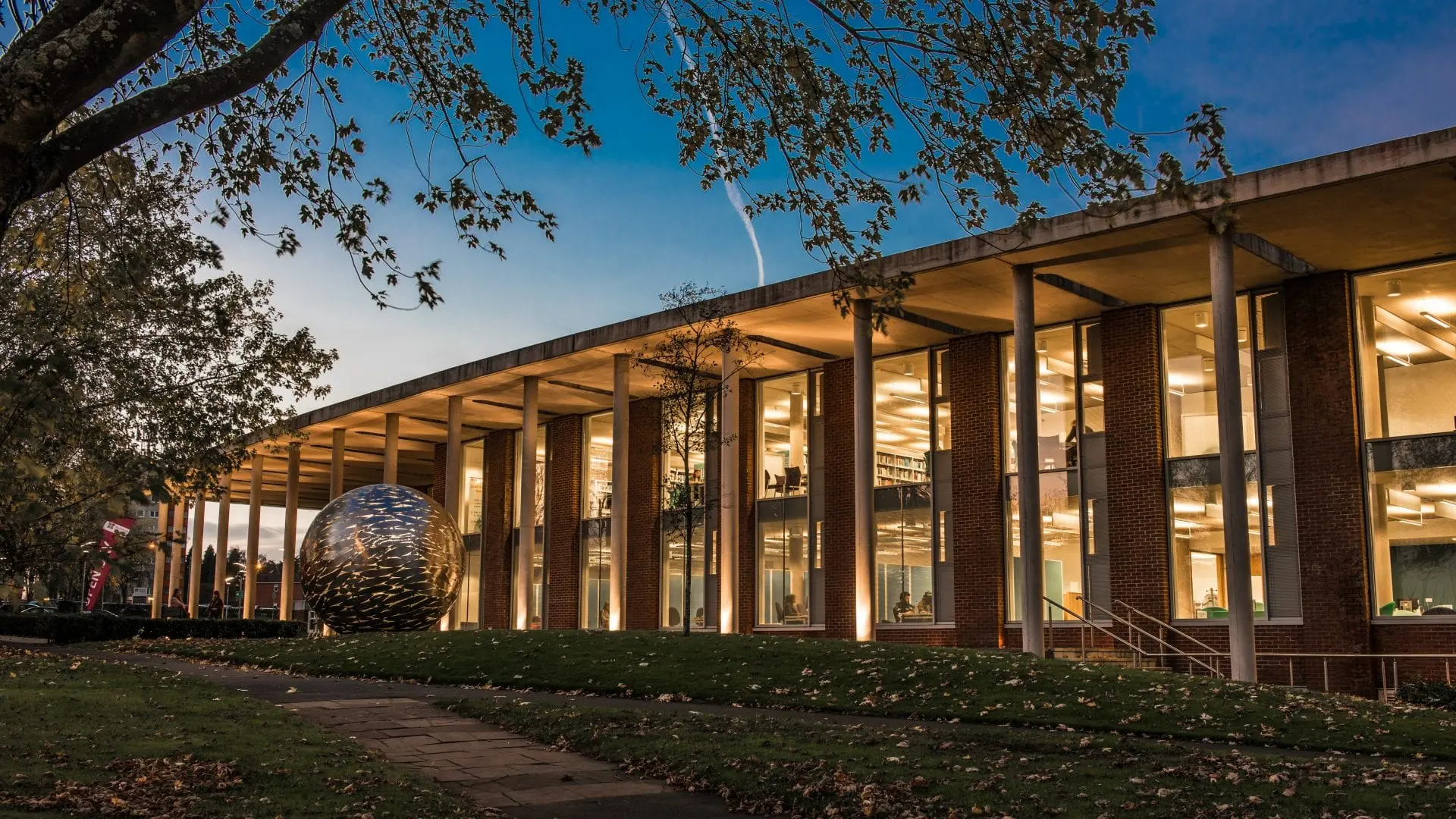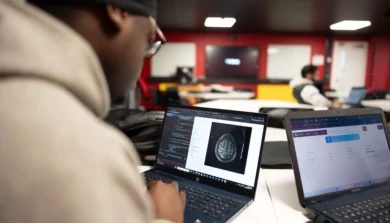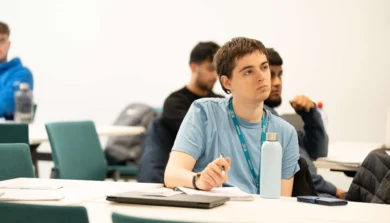BSc Single Honours Computer Science
Undergraduate
- Start date
- –
- Study mode
- –
- Course length
- –
- UCAS Code
- –

Interested in a different start date?
Discover how computing knowledge and digital skills prepare you to design, develop and evaluate solutions for a rapidly evolving technological world. The BSc (Hons) Computer Science at Birmingham Newman University is a full-time, three-year undergraduate degree designed for students seeking a strong foundation in computing and software development.
Whether you are aiming to become a software engineer, systems analyst or progress into postgraduate study, this course offers a flexible and practical route into a wide range of digital careers.
Book a free consultation
Want to find out more about your options? Book a free consultation with an Academic
Why study this course
Studying the BSc (Hons) Computer Science at Birmingham Newman University offers a future-focused and professionally relevant route into the digital sector. Whether you're entering the tech industry, transitioning into a new field or continuing your studies, this course provides the technical foundation and adaptability needed to succeed. With a strong emphasis on ethical practice, innovation and real-world application, you will graduate ready to make a confident contribution to computing and digital transformation.
‘Every expert was once a beginner. Every line of code is a step forward. Every innovation creates new frontiers and new responsibilities. When you write your first line of code, it is not just a command for the machine, but a step towards reshaping the future.’ Adnan Qureshi, Senior Lecturer, Computer Science
Explore the Foundations of Modern Computing
You will study a well-rounded curriculum that includes programming, algorithms, databases, systems architecture and software engineering. These subjects are delivered through a blend of lectures, workshops and collaborative projects, encouraging you to apply your skills to practical scenarios. Alongside technical learning, you will explore the ethical, legal and social responsibilities of working in computing, helping you make informed decisions in professional contexts.
Supportive and Personalised Learning
At Birmingham Newman University, you will be part of a close-knit academic community that supports your growth. Teaching is delivered by experienced lecturers who bring both industry insight and academic expertise to the classroom. With small class sizes, regular feedback and a consistent weekly structure, you will benefit from a supportive environment that encourages both personal and professional development. On graduation, you will hold a full honours degree and be well-prepared for a range of computing careers or further study.
Complimentary Surface Pro
All Computer Science students set to start in 2026 will receive a Surface Pro laptop.
This will be automatically loaned to you for the entire duration of your course. This exclusive, dedicated device is yours to support your studies from day one.

Got a question you’d like to ask?
Entry requirements
We welcome students from all backgrounds and accept a wide range of qualifications. If yours aren’t listed, don’t worry – our Admissions Team can help you explore your options. See full entry requirements.
• A-Level: Grade profile of BBC or 112 UCAS Tariff Points.
• BTEC: Grade profile of DMM. This can be achieved from either an Extended National Diploma or a combination of smaller BTEC qualifications.
• T-levels: A T-level with an overall Merit grade.
If English is not your first language, you must have the following IELTS score:
· Foundation courses: A Secure English Language Test equivalent to IELTS 5.5 IELTS with a minimum of 5.5 in each component.
· Undergraduate courses: A Secure English Language Test equivalent to IELTS 6.0 with a minimum of 5.5 in each component.
Other English language qualifications are also accepted. Please contact admissions for further information.
Please contact Admissions if you have any questions.
Course fees
The tuition fee for academic year 2026/27 is: £9,790. Tuition fees for courses starting April to May 2026, fall within the 2025/26 academic cycle.
Fees for the 2025/26 academic year can be found on our Student Finance pages.
Additional costs
The University will review tuition fees and increase fees in line with any inflationary uplift as determined by the UK Government, if permitted by law or government policy, in subsequent years of your course. It is anticipated that such increases would be linked to RPI (the Retail Price Index excluding mortgage interest payments).
Computer Science News

Andrew Csizmadia Named Fellow of the British Computer Society for Excellence in Computing Education
Andrew Csizmadia SFHEA, Emeritus Fellow in Computing Education at Birmingham Newman University, has been appointed…

Book an open day
Find out about our next open day. Book now to secure your place.
Placement information
This course enables students to develop competence in key themes such as artificial intelligence, data science and cyber security, alongside wisdom in their application domains, sufficient for them to progress to postgraduate study or employability.
A rigorous, coherent and engaging curriculum that draws on the teaching strengths and research expertise in the subject area, aims to provide students unfettered learning opportunities tailored to address emerging technologies and specialisms.
Learning opportunities encourage and support the spirit of intellectual curiosity and enquiry, an ability to apply computational thinking to solve problems and the capacity for creative computing.
Relevant professional bodies (e.g. British Computing Society) inform the learning experiences provided to acquire and develop the practical skills essential within Computer Science.
Students develop an appreciation of legal, professional, economic, environmental, moral and ethical issues involved with Computer Science and their impact upon society.

What careers can I consider
Graduates of this degree are well-prepared for roles in software development, IT consultancy, systems analysis or further academic study. You may choose to work in areas such as application development, digital infrastructure or technical support across public, private or voluntary sectors.
The course also supports progression into postgraduate study or professional certification. You will be equipped to contribute confidently to technology teams and help shape innovative digital solutions. Support from Birmingham Newman University’s Careers and Employability Service includes mentoring, networking opportunities and guidance on further study or employment.
Accreditations and exemptions
This degree is academically rigorous and professionally relevant, preparing you for careers that require strong technical knowledge, ethical awareness and problem-solving skills. The curriculum is aligned with current academic frameworks and informed by industry expectations.
As a student at Birmingham Newman University, you will gain experience with widely used programming languages, development environments and tools, supporting progression into postgraduate study, professional certification or employment in computing, software development or related fields.
Courses we think you'll also like

BSc Single Honours Computer Science with Cyber Security
- Start date:
- September 2026

BSc Single Honours Computer Science with Artificial Intelligence
- Start date:
- September 2026

BSc Single Honours Computer Science with Bioinformatics
- Start date:
- September 2026

PGCE Secondary Computing with recommendation for QTS
- Start date:
- September 2026
